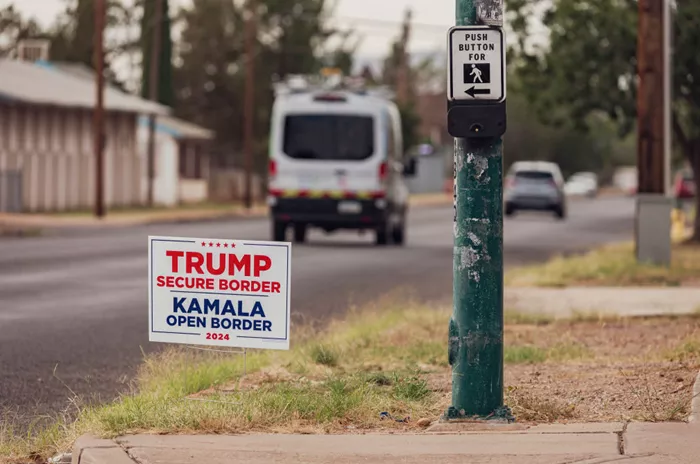Donald Trump’s victory in the 2024 presidential election sets the stage for the return of his controversial immigration policies, including mass deportations and new efforts to prevent migrants from entering the United States.
In a speech early Wednesday at Mar-a-Lago in West Palm Beach, Florida, Trump outlined his plans for securing the U.S.-Mexico border, a key part of his vision for the country’s future.
“We’re going to help our country heal,” Trump said. “We have a country that needs help, and it needs help very badly. We’re going to fix our borders, we’re going to fix everything about our country, and we’ve made history for a reason tonight, and the reason is going to be just that.”
Mass deportations were a cornerstone of Trump’s campaign and are expected to be a major focus of his administration. He has pledged to remove the estimated 12 million undocumented immigrants in the U.S., many of whom entered during the Biden administration. Trump has suggested using the National Guard and even the U.S. military to assist in these efforts, though it is unclear whether he will seek congressional approval and funding for such actions.
An October report from the American Immigration Council highlighted the high costs of mass deportation, estimating that removing just 1 million undocumented immigrants per year could cost more than $88 billion annually, totaling nearly $1 trillion over 10 years.
During his first term, Trump implemented the “Remain in Mexico” policy, which forced asylum-seekers to stay outside the U.S. while their cases were processed. Although the Biden administration ended this program in 2022, the Department of Homeland Security introduced new rules earlier this year that place stricter limits on asylum seekers.
Trump’s election will likely lead to a reversal of Biden-era policies that were more lenient toward immigrants crossing the border illegally. Some of these policies are currently under legal challenge.
One such policy, the “Keeping Families Together” initiative, allowed certain immigrant spouses of U.S. citizens to remain and work in the country. Another is the Deferred Action for Childhood Arrivals (DACA) program, which protects young immigrants who were brought to the U.S. as children, often called Dreamers. Trump tried to end DACA during his first term, and a second attempt may be on the table in his new administration.
Immigration advocates are expected to continue challenging these policies in court. Kica Matos, president of the National Immigration Law Center, said her group would fight Trump’s proposals, as it has done before.
“Trump and his allies told us what he plans to do: mass deportations, ending birthright citizenship, ending the right to public education for immigrant children, internment camps, and using the military to hunt down immigrants. We should take him at his word,” Matos said.
Under the Biden administration, Temporary Protected Status (TPS) was expanded to offer refuge to migrants from countries experiencing crises, such as Lebanon and Haiti. This could change under a Trump presidency. Last month, the Department of Homeland Security (DHS) announced that nationals from Lebanon would be eligible for TPS due to ongoing violence in the region. Haitian migrants, in particular, are a point of controversy, with Trump having previously made disparaging remarks about them. Vice President-elect J.D. Vance criticized the decision to grant TPS to Haitian migrants, calling them “illegal aliens.”
Trump has also promised to increase pressure on “sanctuary cities,” which limit cooperation with federal immigration enforcement. His administration may seek to cut federal funding to cities that protect undocumented immigrants.
In addition to harsher policies on undocumented immigrants, Trump has vowed to reform legal immigration pathways, including the H-1B visa program, which allows skilled workers from abroad to work in the U.S.
Charles Kuck, an immigration lawyer based in Atlanta, warned that changes could include salary-based visa lotteries, higher filing fees, and tougher enforcement against companies hiring foreign workers. Kuck also predicted longer processing times and higher denial rates for visas, with no plans to expand legal immigration or ease country-specific visa limits.
Immigration advocates have raised concerns about the economic consequences of a Trump-led immigration overhaul. Benjamin Johnson, executive director of the American Immigration Lawyers Association (AILA), warned that such policies would harm the U.S. economy and communities.
“If implemented, the anti-immigrant policies avowed by Candidate Trump will inflict lasting damage to the American economy, communities, and character,” Johnson said. “AILA and its more than 16,000 members will continue to defend the Constitution and stand against laws and policies that violate due process, undermine civil rights, or denigrate the contributions of immigrants.”
Related topics:
- Immigrants in New Mexico and Beyond Caught in Voting Allegations
- Local Organizations Assist Immigrants with Housing, Jobs, and Visa Support
- How a Trump or Harris Victory Could Impact Indians Seeking H-1B Visas


